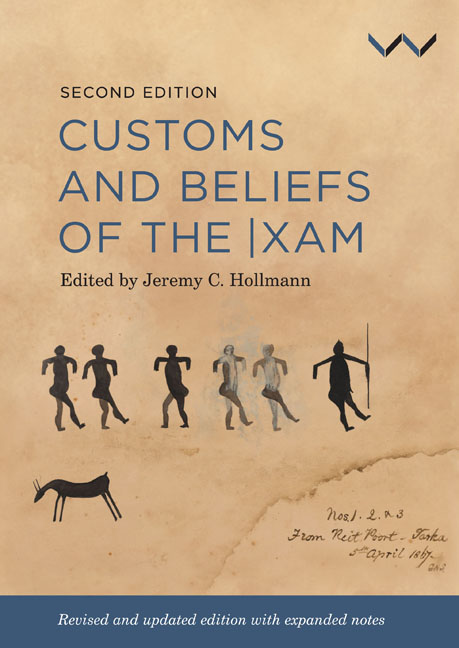Book contents
- Frontmatter
- Dedication
- Contents
- Acknowledgements
- Foreword To The Second Edition
- Foreword To The First Edition
- Introduction
- Contributors
- The |Xam Language
- The People In The Notebooks
- Part 1 Baboons
- Part 2 The Lion
- Part 3 Game Animals
- Part 4 Omens, Windmaking, Clouds
- Part 5 Rain
- Part 6 Rainmaking
- Part 7 Sorcerers
- Part 8 More About Sorcerers and Charms
- Part 9 Special Speech of Animals and Moon
- Appendix 1 |Xam Grammar
- Appendix 2 Summary of The Narratives
- References
- Index
Part 8 - More About Sorcerers and Charms
Published online by Cambridge University Press: 24 November 2023
- Frontmatter
- Dedication
- Contents
- Acknowledgements
- Foreword To The Second Edition
- Foreword To The First Edition
- Introduction
- Contributors
- The |Xam Language
- The People In The Notebooks
- Part 1 Baboons
- Part 2 The Lion
- Part 3 Game Animals
- Part 4 Omens, Windmaking, Clouds
- Part 5 Rain
- Part 6 Rainmaking
- Part 7 Sorcerers
- Part 8 More About Sorcerers and Charms
- Part 9 Special Speech of Animals and Moon
- Appendix 1 |Xam Grammar
- Appendix 2 Summary of The Narratives
- References
- Index
Summary
Of the nine articles on |xɑm customs and beliefs published in the Bantu Studies series, three – Parts 6, 7 and 8 – are about ǃgiːtǝn, who make rain, heal people and control game. Part 8 includes accounts of ǃgiːtǝn whom Diäǃkwɑin and |hɑŋǂkɑssʼo knew, a story by ǂkɑsiŋ about rainmaking and descriptions by ‖kɑbbo of a plant with potent properties.
Some of the narratives refer to aspects of ǃgiːtǝn's behaviour that have already been mentioned (Parts 2, 5, 6 and 7). For instance, ǃgʌerriten-dé, like the sorceress Tɑãnõ-ǃkhɑukən (Part 7), is a ‘springbok sorcerer’ (wɑi-tɑ ǃgiːxɑ) and wears a scalp cap made of springbok skin; both ǃgiːtǝn claim to control the behaviour of springbok. The renowned rainmaker ǃnuiŋ-|kúïtǝn, like Tãnõ-ǃkhɑukən, can transform himself into a lion and ‘go about’ (taijɑ) at night (see the introduction to Part 2, as well as the Part 7 narratives about transformation into a lion).
The breaking of the string
In Narrative 8.1, Diäǃkwɑin relates a song about ǃnũːïŋ (‘the string’) that his father, Xãːätiŋ, sang after the death of ǃnuiŋ-|kúïtǝn, his ‘teacher’ (line 102). ǃnuiŋ-|kúïtǝn was a sorcerer who died at the hands of a Boer commando while on a magical expedition in the form of a lion. ǃnuiŋ-|kúïtǝn's death changes Xɑ̃ːätiŋ's perception of life: the ‘place’ seems ‘open’ and it no longer feels ǂhɑnnũwɑ, a word variously translated as ‘comfortable’, ‘happy’, ‘good’, ‘nice’ and ‘fortunate’ (Bleek 1956: 650). |hɑŋǂkɑssʼo mentions a similar instance in Narrative 3.4: hunters experience a time when things are not ǂhɑnnũwɑ after their friend's death; they miss their aim and the springbok they shoot are not easily wounded. Diäǃkwɑin says that Xãːätiŋ heard the string ‘ringing’ (‖kɑ‖kauïŋ) when ǃnuiŋ-|kúïtǝn ‘called forth’ a rain animal. After ǃnuiŋ-|kúïtǝn's death, however, he no longer hears the sound of the string in the sky. In addition to hearing the string, Xɑãːätiŋ also felt it as ‘vibrations’, darrɑkǝndarrɑkǝn, in his body. (See Narratives 7.16 and 8.2, also Part 4, for more on somatic sensations that connect people with each other, and other animals.) The vibrations stop when ǃnuiŋ-|kúïtǝn dies. The ‘string’ and its attributes might allude to the thong (ǃhɑ̃u) that a rainmaker uses to control a rain animal. In Narrative 6.3, people realise that the thong is broken when they hear a ‘ringing sound’ – ‖kɑ‖kauïŋ, the same word that Xãːätiŋ uses – in the sky.
- Type
- Chapter
- Information
- Customs and Beliefs of the |xam , pp. 375 - 442Publisher: Wits University PressPrint publication year: 2022



